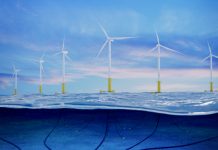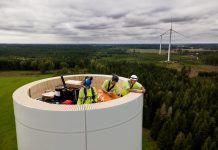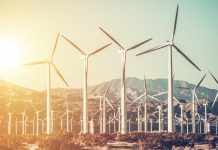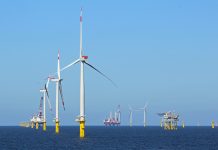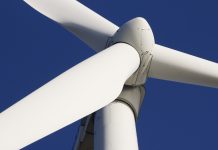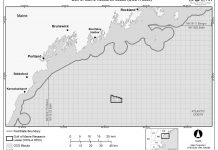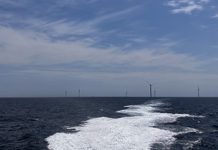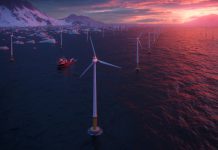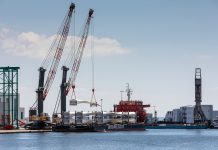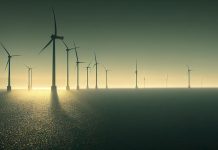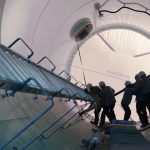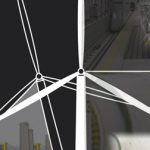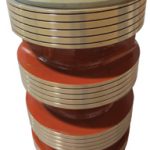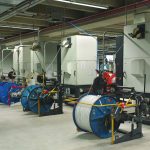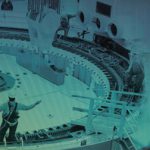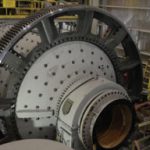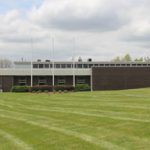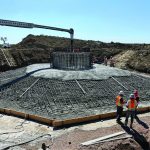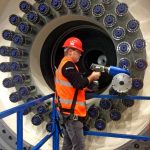The pieces that come together to build a wind farm and keep it operating are complex and numerous, so it’s important to be able to corral those pieces efficiently and economically.
The experts behind Alpha Offshore Service, a Sparrows Group company, get involved with all aspects of a wind farm’s production life, often from the very beginning.
“Essentially, we can deliver everything within O&M, but we’re also supplying site managers, site supervisors, and quality inspectors and commissioning technicians for OEM construction sites,” said Mikkel Lund, CEO of Alpha. “We’re working with everything within the cell, in addition to carrying out some installation work.”
Those installations are full-time operations, according to Lund, however a large portion of Alpha’s workforce, approximately 90 percent, is involved mainly with maintenance, blade upgrades, and blade repairs.

Blade Repair Essentials
Blade repairs are organized into five categories, with categories 1-3 dealing with cosmetic repairs and categories 4-5 involving significant repairs, according to Per Madsen, Alpha’s global head of operations for blades.
“The blades are getting bigger, and they’re getting more complex,” he said. “There are new setups that have not been seen before. New technology includes putting carbon into the blades to make them much lighter in weight, and by using carbon, companies can also produce longer split blades where you can remove the tip of the blade and extend it with a new tip if needed. Most of the repairs that we see are the result of lightning strikes, failures from factories as wrinkles, delamination, bonding issues, etc. This is when our team from Alpha arrive to begin the repairs for these setups.”
Another environmental challenge that is affecting the longevity of offshore turbine blades is salt water, according to Lund.
“Salt water is one of our biggest issues,” he said. “Ultimately, as we see longer blades being introduced, we’ll be encountering different types of new repairs in the future.”
Core of Alpha’s Business
Lund stressed that it’s not only important to get the work done, but to achieve it in the most efficient way available.
“Protection of the assets and maintaining the cost and the satisfaction of what we do is also something we focus on, because that is the core of our business — to receive positive customer feedback so we can sell our services to other clients and maintain a positive profit from our services,” he said. “We do see a lot of competitors in the market. There are many new starters who are driving down prices, but we see low, poor quality. We are fighting with the procurement teams to see if we can at least achieve a decent margin of what we do for a living.”
That desire to keep its customers satisfied has been a driving force for Alpha as it services the wind energy industry, according to Lund.

“We invest a lot in training and development for our employees,” he said. “Each OEM has specific training requirements, and the training has increased over the last couple of years. This has changed in the last 10 years, when previously we were all in the field and there was no such requirements or training. It was basically only the GWO, with more or less everybody globally having GWO basics training. Training has now been standardized, so we are all on the same page. When it comes to OEM specific training, that’s where we spend a lot of investment in our employees and contractors.”
Although based in Europe, Alpha continues to branch out around the world and is now part of the Altrad Group, which has more than 60,000 employees globally, according to Mikkel Vestergaard Rue, global head of operations at Alpha.
“We have business units in North America — in Houston, Texas — at the Sparrows facility there,” he said. “And at the beginning of last year, we set up an entity there as a branch of Alpha within the Sparrows region and started to build up our back office and resources in the U.S. Previously, we had just run all the resources out of Europe, but this proved a little bit different — and difficult as well — with the time difference and other challenges, so creating a local based presence in Sparrows’ Houston facility has it made our operations easier.”
Rue emphasized that this has been the model for other Alpha hubs as well.
“We have the same in Australia, with this hub having a local base,” he said. “All these locations are also supported with European instructors and supervisors that have many years of experience in the wind industry in Europe. Here in Europe, we are further advanced than other regions in the world, so we have all the expertise and knowledge, which is what is needed in the US and Australia.”

Quick Mobilization
A large part of what Alpha’s customers most appreciate is the company’s ability to get to a location quickly to tackle any challenges and problems that may arise, according to Rue.
“We have always been able to mobilize at very short notice, and that’s what we are known for,” he said. “We have been quite open and flexible when it comes to this. It’s always a Friday afternoon when customers call. They have an issue, and they need to have it solved quite rapidly. The whole management team here has at least 15 years of experience, on average, in this industry, and we have access to many technicians. Since we have been working with our clients for so many years, we often know what it is that they need, and we always manage to get the people on site before Monday morning when they are needed to start work.”
Lund agreed with Rue.
“This is what we’re known for, and we are a supplier to the OEMs,” he said. “We know when they call us, they have a need. There could be a turbine down, and we know the cost for the big turbines. We’re talking now about 15-MW turbines in the near future being installed offshore. We need to mobilize quickly, and we need to find and send the right technicians with the right attitude and the right skill set, in order to get that turbine on the grid again. This is probably where we are different from other competitors in the business. Every time we sort out an issue or task for individual clients, it’s a good achievement.”
It is essential Alpha’s clients are satisfied, according to Madsen.
“It’s important that our clients, our OEMs, are happy, so we are totally focused on going in, getting the job done and then, with the best result, go out again — also in the quickest time because time is money in this business,” he said.

Servicing Offshore from the Start
Alpha Offshore Service was established in 2007 to offer technical services to offshore wind turbines. It has since worked on more than 1,000 wind farms around the world in countries including Vietnam, Japan, Australia, New Zealand, South Africa, Jordan, the U.S., and the whole of Europe.
In 2017, Alpha became part of the Sparrows Group, which strengthened Sparrows’ position in the renewables sector and enabled Alpha to use the wider group’s geographical footprint and technical network to support customers in new regions. The company then became part of the Altrad Group when Sparrows was acquired by them in July 2022.
With an average of more than 4,000 blades inspected every year, all of Alpha’s workforce are GWO certified.
Recently, Alpha was involved in a complicated blade upgrade project in South Africa where it had more than 25 highly skilled European blade technicians performing category 5 repairs and upgrades that included major complex structural blade repair. The project took approximately 14 months and was completed without any incidents or quality issues. The customer was extremely satisfied with Alpha’s job performance, according to Lund.
Looking to the Future
As wind farms continue to grow and blades continue to get bigger, Lund said that Alpha’s presence within the industry will grow in parallel.
“Within five years, we will have doubled our sites worldwide,” he said. “The turbines and the market data say it all. Turbines will be bigger, and there’ll be more turbines globally. We do see that next year, 2023, will be difficult for everybody. All the OEMs are struggling to make money, and we have seen them all make significant losses in 2022. We might see a drop in the installation capacity for next year, but again, our core area is service and maintenance, so it might not have a huge impact on our business. However, we will grow with our clients, and we’ll grow in the new areas where turbines will be installed. We are now focusing on offshore work in Japan and Taiwan, which we believe will be a new growth area, and we will remain focused on Europe, which is our core business. We have a good background in the U.S. and in Australia, and we expect this is where we will see Alpha’s immediate growth coming from.”
More info www.alphawindservices.com



